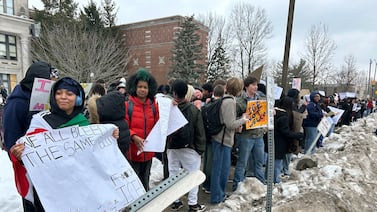Sign up for Chalkbeat Tennessee’s free newsletter to keep up with statewide education policy and Memphis-Shelby County Schools.
Former Memphis-Shelby County Schools Superintendent Marie Feagins is now suing a board member for personal defamation in an ongoing lawsuit over her January firing after less than 10 months on the job.
Feagins testified on Tuesday in Shelby County Circuit Court, where Judge Robert Childers considered Feagins’ request for a preliminary injunction, which would overturn the board vote to terminate her contract and reinstate her as district leader as the lawsuit plays out.
“I came here to do a job, and we have unfinished business,” Feagins said on the stand. “I didn’t come to sue the school district.”
At issue, Feagins alleged during a seven-hour hearing Tuesday, was multiple instances of board members meeting secretly to orchestrate her ouster, which she says violates the Tennessee Open Meetings Act. But the defendants’ lawyer argued that board members can privately discuss the superintendent’s job performance without running afoul of state law.
At one point, Childers struck some of Feagins’ testimony over hearsay concerns.
The divided board ousted the former superintendent in January in a 6-3 vote, with the majority accusing Feagins of professional misconduct and poor leadership less than a year into her tenure. Dozens of community members, including teachers and elected officials from both parties, urged the board to retain Feagins prior to the vote.
Feagins filed her lawsuit in February. She also alleged that interim Superintendent Roderick Richmond, a longtime district administrator, was informally tapped to take over her job after meeting with board members in the fall.
The judge on Tuesday granted Feagins’ request to amend her official complaint to include defamation claims against board member Towanna Murphy, who she says spread “absolutely reckless and wild” rumors that Feagins participated in stealing her personal car and committing forgery.
Murphy declined to comment Tuesday night on Feagins’ defamation allegations.
“At stake here is not just Dr. Feagins,” said the former superintendent’s attorney William Wooten. “It’s the public’s right to open, lawful decision-making by elected officials. That right has been disregarded, trampled and violated.”
Feagins said Tuesday that she never received a formal evaluation from board members for her performance despite being fired with cause. She also said the “baseless allegations” and “smear campaign” ruined her reputation and future employment prospects.
She’s seeking $487,500 in backpay and additional benefits in the lawsuit.
But Robert Spence, the lawyer representing the district, said Feagins is conflating the school board’s right as her employer to talk about job performance privately with “deliberation and decision-making,” as outlawed by the Open Meetings Act.
Spence said the “absence of proof” of that line-crossing is the “biggest gulf” between Feagins and the district.
Wooten said that clearing the bar for a preliminary injunction only requires the plaintiff to show there is “likelihood of success” based on the merits they have before the full trial begins, and demonstrate “irreparable harm.” It does not require the case to be proven in full, according to state law.
During the hearing, Spence made multiple objections to what he called “quadruple hearsay” from Feagins, saying her main evidence is based on hearing things from other people, not witnessing or hearing conversations herself.
Feagins said having actual knowledge of what was said in meetings “would mean I had awareness in real time.”
Instead, she described phone calls and conversations where she was asked about her ousting before she ever received official notice from the board. Wooten presented invoices, call logs, and text messages – evidence of what he called “serial private meetings” that led up to Feagins’ firing.
But Judge Childers rejected some of the testimony from Feagins where she described conversations between other people that she wasn’t present for, calling it “hearsay twice-removed.”
Some key takeaways from witness testimonies
Feagins said she first heard mentions of her potential termination in August 2024. She alleged Tuesday that then-Vice Chair Joyce Dorse-Coleman, who introduced the formal resolution to fire Feagins on Dec. 17, told her over the phone that she “had the votes” to oust her.
Feagins said board member Stephanie Love told her over the phone about a meeting between herself, Dorse-Coleman, and former board chair Althea Greene on August 21 where they discussed firing the superintendent – one of many meetings Feagins said happened before the resolution to terminate her was publicly introduced.
Feagins also said she received a text from Love and other board members with the first draft of a resolution on Oct. 16.
“If it’s being circulated, it’s obviously being discussed amongst the board members,” Wooten added.
Deidre Malone, who runs a PR firm hired by the school board from November 2024 through June 2025, told the courtroom that she did not conduct or witness any behavior that violated the Tennessee Open Meetings Act while working with the school board.
But Wooten said a series of meetings documented in Malone’s invoices to the board contradicts that claim.
On December 7, Malone billed the board for four hours of work on a communications plan that she said Tuesday was “80%” about Feagins’ potential termination. Malone met with board Chair Dorse-Coleman and Vice Chair Love on Dec. 10 and 16 to discuss that “communications strategy,” she said on the stand, and to film videos with the board leaders explaining the reasoning for her termination.
All of those meetings pre-date the first “special meeting” called by board members to publicly discuss the termination resolution on Dec. 17.
Malone also had calls with four of the six board members who voted to terminate Feagins, according to her invoices, in the days following that Dec. 17 meeting.
“We represented all the board members who wanted us to represent them,” Malone said. Those conversations were about Feagins, she said, and “preparing [board members] for what was going to happen next.”
Wooten also presented texts that Jalen Washington, who works with an outside tutoring company employed by the school board, sent to Feagins’ former executive manager, warning him about the superintendent’s pending termination – and saying that Richmond would be her replacement.
Washington sent those texts on Dec. 14. But he said Tuesday that he “can’t recall” who he got the information from, saying he heard rumors from many people and the media.
Wooten played a Dec. 18 Fox13 interview of board member Murphy, where she says Chair Dorse-Coleman personally called every member of the school board two days prior to Dec. 17.
“I think an elementary student could show the violations in this video,” he said.
Feagins said that as soon as she saw the interview, it became “obvious” that the decision to fire her “was predetermined.”
Bri Hatch covers Memphis-Shelby County Schools for Chalkbeat Tennessee. Reach Bri at bhatch@chalkbeat.org.






